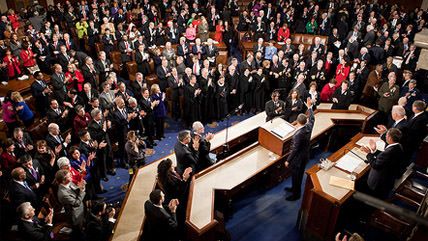Most Americans Shrug at State of the Union Spectacle
As President Gerald Ford once said, "the state of the union is not good"

My fellow Americans, the State of the Union is … irrelevant.
Quick: Give me a memorable line from any of President Obama's previous five SOTUs. That's what I thought. I couldn't give you one offhand -- and it's my job to watch these pompous, unedifying spectacles and write about them.
The few enduring lines from past SOTUs stick out for irony value (Bill Clinton in 1996: "the era of big government is over"); because they herald a looming policy disaster (George W. Bush in 2002: "Axis of Evil") -- or for the rare outbreak of candor (Gerald Ford in 1975: "the state of the union is not good").
But most years, the speech gets submerged in the churn of the news cycle, little noted and not long remembered. It's unlikely that 2014 will be any different. In its modern form, the SOTU is a meaningless ritual that rarely even does the president — let alone the public — any good.
That's bad news for a chief executive whose chief talent is speechifying. "I have a gift, Harry," then-Sen. Obama unhumblebragged to Sen. Harry Reid (D-Nev.) some years ago, in the afterglow of a well-received speech. But according to the polling data and the political science research, it's a gift that won't keep on giving.
"There is overwhelming evidence that presidents, even ?great communicators,' rarely move the public in their direction," writes George C. Edwards III, a presidential scholar at Texas A&M University. "Going public does not work." In a 2013 analysis of SOTU polling, Gallup found that "most presidents have shown an average decrease in approval of one or more points between the last poll conducted before the State of the Union and the first one conducted afterward."
As the speech has become less important, presidents' rhetoric has grown more frantically stentorian. Presidential scholar Elvin T. Lim notes "increasing rhetorical assertiveness" and "an increasing lack of humility" in the language of the SOTU over time. Modern presidents speak more often of "reform," while "references to (and hence concern for) the Constitution and constitutional in the annual messages have declined."
You'd hardly imagine it from watching the speech, but the SOTU has constitutional roots, in the duty imposed on the president by Article II, sec. 3: "he shall from time to time give to the Congress Information of the State of the Union and recommend to their Consideration such Measures as he shall judge necessary and expedient."
Modern presidents do a lot more hectoring than recommending, treating the SOTU as an occasion to tell Congress what to do. That doesn't mean Congress actually does it: The speech is "high volume, low yield" in terms of legislative success, as a recent Associated Press analysis puts it.
Which, no doubt, is why the administration is signaling that tonight's SOTU will be less about telling Congress what to do than it is about telling them what he plans to do without them. This will be "a year of action," White House press secretary Jay Carney said Sunday, and the president will "bypass Congress where necessary to lift folks who want to come up into the middle class." The White House has hinted at unilateral action on issues like carbon emissions, student loans, and job training. "We need to show the American people that we can get something done," says presidential adviser Dan Pfeiffer.
It seems the president plans to go it alone, loudly. But in a recent Christian Science Monitor/TIPP poll, 55 percent of Americans disapproved of presidents "taking executive action when Congress is gridlocked." He'll have to talk them into liking it.
This column originally appeared in the Washington Examiner.


Show Comments (101)